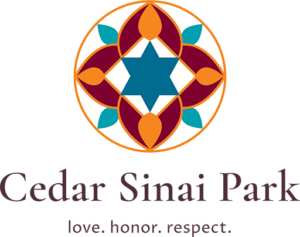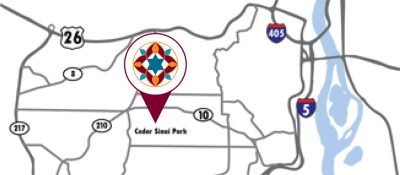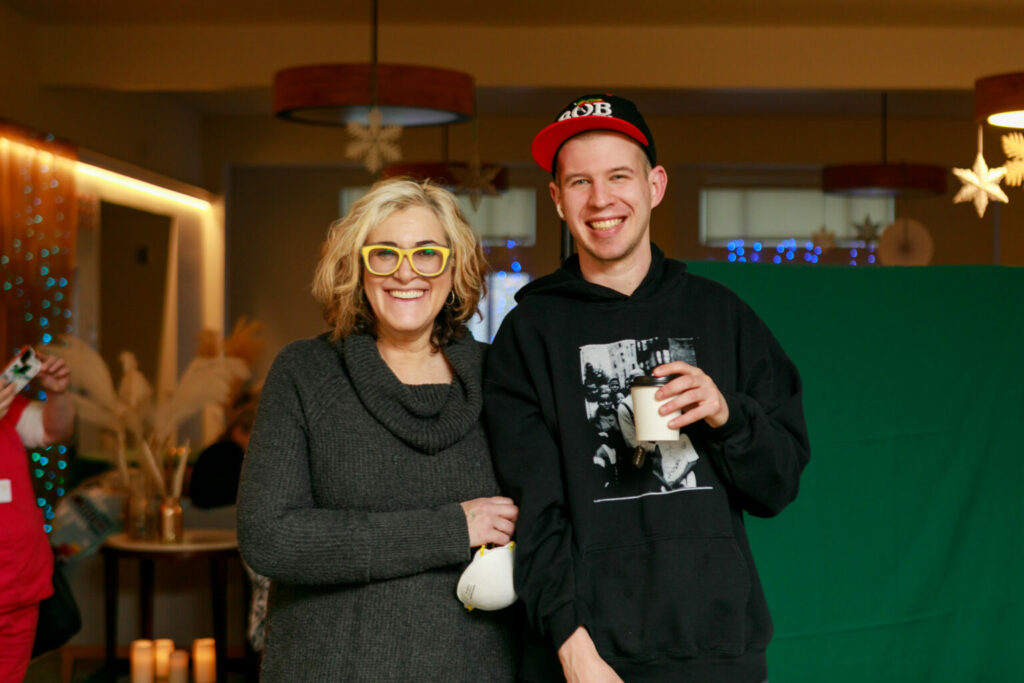
Trevor Richen grew up in Portland in the food world. His great grandfather owned Griffin’s, a 1970s “cafeteria” in downtown Portland, where his parents and extended family worked before Trevor was born. The Rose Schnitzer Manor Assisted Living server considers himself a foodie.
“I like everything,” said Trevor, wearing one of his stylin’ baseball hats and duds after a shift. “I’m a sucker for pizza, but I also love branching out. I love Mexican food,
Trevor Richen grew up in Portland in the food world. His great grandfather owned Griffin’s, a 1970s “cafeteria” in downtown Portland, where his parents and extended family worked before Trevor was born. The Rose Schnitzer Manor Assisted Living server considers himself a foodie.
“I like everything,” said Trevor, wearing one of his stylin’ baseball hats and duds after a shift. “I’m a sucker for pizza, but I also love branching out. I love Mexican food, Thai, Chinese. And I like to cook.”
Trevor even took a 16-week culinary class, which brought him to Cedar Sinai Park in December of 2021.
“My culinary class was led by Chef Jon who used to work here, and he recommended I apply for a job. I already lived here at Kehillah and he put in a good word for me with Andy Staggs, culinary services director.
“Andy Staggs; executive chef and culinary director contacted me and scheduled an interview, which was literally right after I graduated from the class.
“I love it here,” said Trevor. “It’s the best decision I ever made. And the second-best decision was living at Kehillah.
“I love being around the people, coworkers, and the residents. I think being amongst a community that’s full of good vibes and love is really big. It makes things easy.
“And my parents can tell I’m happy, and they are truly indebted to this place.”
Trevor grew up in Portland and attended Madison and Wilson (now Ida B. Wells) High Schools, the latter of which was a family tradition (his grandfather was in the first Wilson graduating class). He moved into Kehillah when it opened 10 years ago for adults with developmental disabilities. Located on the Cedar Sinai Park campus, Kehillah supports resident inclusion within the community through social activities and employment assistance.
Previous to Cedar Sinai Park, Trevor worked as a dishwasher at St. Honore Bakery, and had to get up at 5 a.m. to take the bus to Northwest Portland. Covid closed St. Honore, and Trevor was out of work for a few months, then returned to St. Honore from May to August 2021, until he began his culinary course.
“I like that I can walk now literally straight up the hill, and don’t have to take the bus to work,” said Trevor.
Trevor’s favorite part of Cedar Sinai Park?
“I like working with people and getting to know everybody. Seeing everyone smiling because of the food we make is great. And I really like the vibe here; everybody’s just really, really nice and is in good spirits.
“Everybody’s always good to me. I can’t really pinpoint one thing. This place is really amazing for me. I love working here. I think my parents can see that I’m happy, and working in a place that I love.”
Trevor typically works Thursday through Monday.
In his off time, Trevor loves to write and paint and listen to music such as classic rock, reggae, or hip hop. He is an avid exerciser and goes to the Mittleman Jewish Community Center to lift weights and shoot baskets. He loves to talk hockey!
What’s the best meal on campus?
“I really like when we do the spaghetti with meat sauce,” said Trevor. “I’m a sucker for meat sauce.”
Trevor is a favorite on campus if you want a hug or a good listening ear.
“All of the people here are really cordial and sweet,” he said. “I enjoy it here. It’s probably one of the best places to work.”

https://cedarsinaipark.org/wp-content/uploads/2024/06/3.30.23_Bulletin.pdf
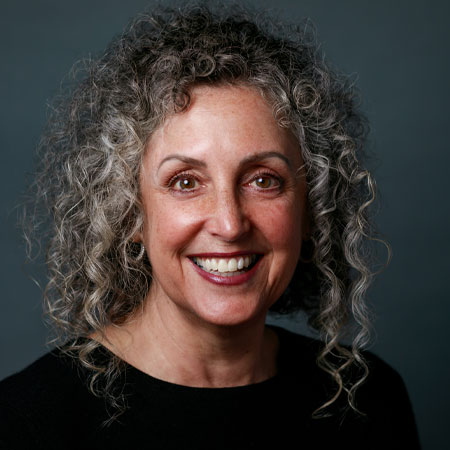
by Kimberly Fuson, Chief Executive Officer
Three years ago, our trustees offered me the privilege to return to Cedar Sinai Park to help steer the organization on to a path of sustainability. With all my heart, I want Cedar Sinai Park to find and take steps to a solid future that will adapt maturely to the changing times and carry us into our next century.
At the core of our mission,
by Kimberly Fuson, Chief Executive Officer
Three years ago, our trustees offered me the privilege to return to Cedar Sinai Park to help steer the organization on to a path of sustainability. With all my heart, I want Cedar Sinai Park to find and take steps to a solid future that will adapt maturely to the changing times and carry us into our next century.
At the core of our mission, always, is caring for our beloved elders, with no compromise. That was the intent of our forebears when they met for the first time on January 4, 1920, to plan for the Jewish Old People’s Home—the first iteration of assisted living—and the Jewish community can be proud of the gemstone that was created and is dearly cherished.
Across the nation, single-site, faith-based, not-for-profit elder care communities are being challenged. Many are failing; hundreds closed last year in the United States. Others are merging or affiliating with bigger corporations.
Decades before the Covid pandemic, the 103-year-old Robison Jewish Home (dba Cedar Sinai Park) has contended with decreasing Medicaid reimbursements. Medicaid does not cover overhead, and only reimburses a certain percentage of each resident’s stay, per day. The reimbursement rate has ranged from 60 to 80 percent over the past decades. Given that the majority of our residents at Robison Jewish Health Center and Harold Schnitzer Center for Living utilize Medicaid, there is a significant gap in what we are paid, and what we have to spend to meet our high standards of care.
Our supportive community has subsidized resident care and services to offset some of the losses. Cedar Sinai Park received significant PPP (Paycheck Protection Program) funds during Covid, which directly subsidized staff wages.
We’ve also known since 2007 that the number of individuals approaching retirement age was rapidly increasing while the available population of caregivers was steadily decreasing. There are not enough nurses in the pipeline because Oregon has the third fewest graduates in nursing programs, and we rank last in the country for degrees awarded from public institutions. Nationwide, we are in a care crisis of monumental proportions.
Despite the ever-changing regulations of short- and long-term nursing care, historically, Robison stayed ahead of the labor curve, thanks to its excellent wages and benefits and terrific culture of community.
However, roughly 15 percent of the national nursing home workforce left the sector when the pandemic began. Finding qualified staff for Robison Jewish Health Center who want to work has been a major hurdle, despite a wage study we conducted during the summer of 2022, which resulted in substantial wage increases for our health professionals. With lower than desired numbers of staff, we haven’t been able to utilize all of the 44 beds in Robison Jewish Health Center short-term skilled nursing since the pandemic hit.
To maintain the quality care for which Robison is known, we have been relying for the past few years on “agency” health professionals, that is people contracted temporarily as nurses, licensed nurse practitioners, and certified nursing assistants. Agencies demand salaries for their professionals two to three times higher than what our employees receive, depending upon the shift they are asked to work.
Our significant staffing shortage coupled with the crushing cost of agency labor means Cedar Sinai Park is facing critical shortfalls monthly. If we continue on our current path, we determined our expenses would soon exceed our cash reserves and given the current climate, we believe we must act now.
With strong support from our trustees, on March 6, we suspended admissions to our post-acute and rehabilitation services at Robison Jewish Health Center until further notice. All of the short-term residents currently at Robison Jewish Health Center are recovering well, and will soon go back to their full lives at home. The five long-term residents in Robison Jewish Health Center have been invited to select an available private suite in the Harold Schnitzer Center for Living.
The 48 private suites in the four households of the Harold Schnitzer Center for Living will remain open, and skilled nursing referrals will continue to be accepted on a very limited basis. We are consolidating all of the Robison Jewish Health Center clinical staff into the Harold Schnitzer Center for Living, and have virtually eliminated all agency health professionals.
All of our Robison Jewish Health Center nursing department positions are preserved. All staff wages have been preserved.
We are consolidating culinary services, and all food production will occur at the Rose Schnitzer Manor kitchen, which will return us to an all-kosher campus.
Seven important humans, who will always be part of our Cedar Sinai Park family, are affected (reduction of hours/lay-off) by the suspension of Robison post-acute care services. We love all our staff and have made every effort to ensure they are cared for and supported during this transition. All staff affected by the suspension of admissions will be offered coaching/counseling, job referrals and letters of recommendation.
Harold Schnitzer Center for Living, Rose Schnitzer Independent and Assisted Living, Adult Day Services, and Sinai In-Home Care are fully functioning and open to the community. We continue to find ways to enhance our care and services, and to improve the quality of life for our residents.
Above all else, Cedar Sinai Park must remain viable for the elders and vulnerable who rely upon us. We have a long tradition of high-quality care and staffing, and we want to maintain that reputation in the community. The decision to suspend Robison admissions was not made lightly; we believe it is the best way to achieve our long-term goals.
Cedar Sinai Park is working with two expert advisory firms to help develop scenarios for sustainability. HJ Sims is an investment banking and strategic consulting firm specializing in senior housing financing. Clifton Larson Allen is an accounting firm whose focus is market analytics for senior care and other industries. We are also consulting with our industry peers and trade associations.
Once those analyses are conducted, Cedar Sinai Park will be in a better position to make decisions about its path to sustainability. We are a strong and sound organization. Cedar Sinai Park must change in order to be responsible and serve the needs of the Jewish community.
Thank you for your generous support of the Home for all of these years. We appreciate your gifts, your guidance, and your grace as we go through this important transition.
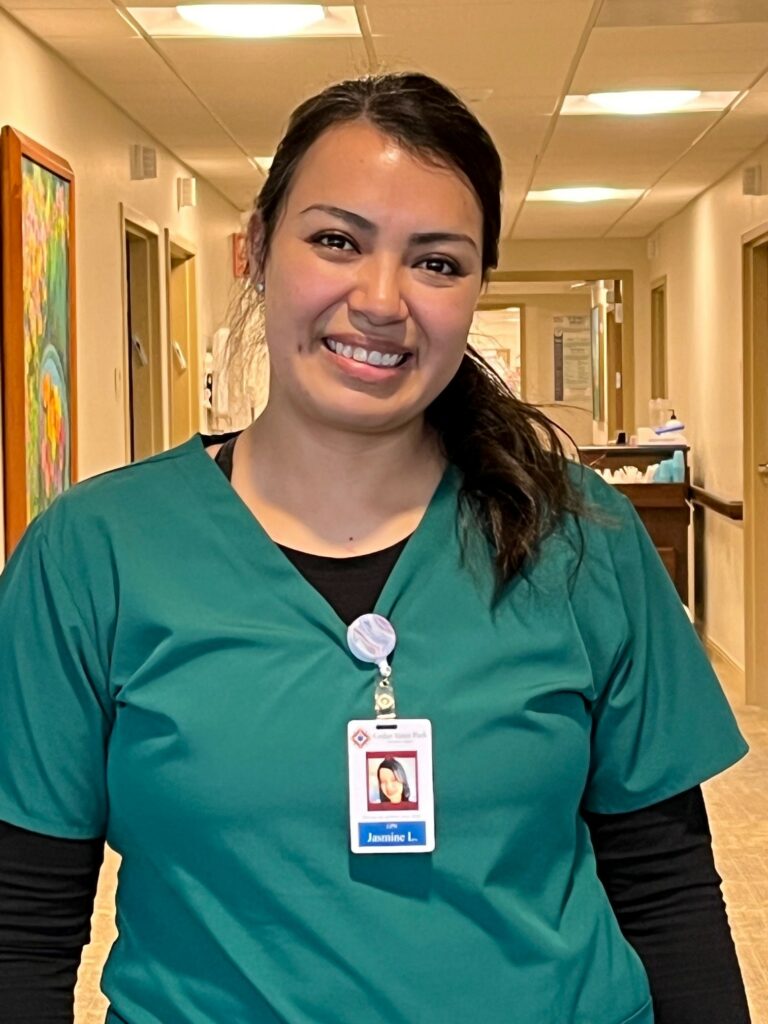
Jasmine Lohn, L.P.N., C.N.A., is a prime example of the interconnectedness and tradition that is Cedar Sinai Park. Her parents worked at Robison Jewish Home when Jasmine was a young girl! So did her grandmother and aunt!
“She looked just the same,” said Harold Schnitzer Center for Living Resident Joeen Rodinsky (z”l), whose mother lived at Robison in the mid-1990s and was cared for by Jasmine’s mother, Aura. “When I came her to live,
Jasmine Lohn, L.P.N., C.N.A., is a prime example of the interconnectedness and tradition that is Cedar Sinai Park. Her parents worked at Robison Jewish Home when Jasmine was a young girl! So did her grandmother and aunt!
She looked just the same, said Harold Schnitzer Center for Living Resident Joeen Rodinsky (zl), whose mother lived at Robison in the mid-1990s and was cared for by Jasmine's mother, Aura. When I came her to live, I looked at her, and she said, 'Do you know who I am? I am Aura's daughter.' It was immediate love. I adore her.
Jasmine was born in California where her parents, Aura and Luis, worked at a Jewish community in Sylmar. When they moved to Oregon in 1991, they joined Robison and Jasmine remembers coming to Robison as a child. Aura's mother Julia also worked at Robison and so did Luis's sister, Maria.
It was a cozy place, remembers Jasmine. When you walked into the reception area, they used to make cookies, and it smelled like home.
I remember one resident in particular who used to make necklaces out of beads. She had a big sunflower on the back of her chair, and she would always come and talk to me. And I had my little dog with me.
So I would sit there and eat the cookies that they would give me at reception, and talk with her, and she would show me her collection. She had bags and bags of beads.
It was always really inviting.
Jasmine occasionally read to the residents and put lotion on their hands. Later, she attended Beaverton High School and visited Robison as a teen through their Health Careers program. She said her upbringing definitely influenced her decision to go into health care.
After becoming a certified nursing assistant, she worked at West Hills Village, and then she managed a foster home.
And then in 2010, my mom was like, 'Come apply at Robison! We can all be together. So I ended up coming here and applying and got hired.
Jasmine and her parents all worked at Robison together for the next eight years. She's mainly worked on the Robison side of campus, in post-acute and rehabilitation, and the Harold Schnitzer Center for Living households.
Though Aura is mostly retired, and Luis is working closer to home, Jasmine has stayed on. She attended Portland Community College for her prerequisites to nursing school at Sumner College, but became a licensed practical nurse in 2016.
I enjoy the residents, she said. The relationships that I've built with the residents here, especially in long term care, they're just like family. They're like my grandma and grandpa's, so I really enjoy being around them. I eat dinner with them, and communicate with them about what they're doing.
And every morning, I go say 'hello' to Joeen. I let everyone know that I'm here and then do computer work until the residents are up, and it's time to do blood sugars and meds and then make phone calls.
We have a good team. Everyone is passionate about what they do, and they're caring and reliable. Even when we had the last winter storm, people were staying over and working extra shifts, and being accommodating for other staff members that couldn't come in.
Jasmine lives near McMinnville and spent five hours on the road during the snowstorm going 23 miles an hour and taking it really slow to get to Robison to make her shift (I was a little late, she confessed). Jasmine even spent a night in the Holzman household to ensure she would be here to work the following day.
In her free time, Jasmine enjoys walking and hiking with her fiance, Duncan. She has three children (Aimee, 11; Allyson, 9, and Ailis, 5), and three dogs (a pug, a standard poodle, and a St. Bernard) and Aura and Luis live a block away. They run back and forth to help, said Jasmine.
It's beautiful, that she is here, having grown up here with her family, said Joeen. She is the sweetest young lady. She has a special quality to her. I love Jasmine.
Added Jasmine: I really like it here.
###
TO: Cedar Sinai Park Colleagues, Residents, Families, and Friends
FROM: Kimberly Fuson, Chief Executive Officer
RE: New Covid-19 Positive at Rose Schnitzer Manor Independent and Assisted Living (RSM)
Dear Colleagues, Residents, Families, and Friends,
Since our last communication, we learned that a team member at Rose Schnitzer Manor Independent and Assisted Living tested positive for Covid-19. Our team member is fully vaccinated and mildly symptomatic.
Please join me in wishing our beloved team member a speedy recovery.
TO: Cedar Sinai Park Colleagues, Residents, Families, and Friends
FROM: Kimberly Fuson, Chief Executive Officer
RE: New Covid-19 Positive at Rose Schnitzer Manor Independent and Assisted Living (RSM)
Dear Colleagues, Residents, Families, and Friends,
Since our last communication, we learned that a team member at Rose Schnitzer Manor Independent and Assisted Living tested positive for Covid-19. Our team member is fully vaccinated and mildly symptomatic.
Please join me in wishing our beloved team member a speedy recovery.
The following continues to apply at RSM until testing is completed per DHS/OHA guidance, and all are negative:
- Indoor visitation within resident apartment/suite.
- Small group activity: Masks required to participate.
- Communal dining; room service is available for those wanting to take extra precautions.
- Residents: Masks strongly recommended in ALL indoor common areas.
All RSM Staff: N95 masks and eyewear required. Visitors N95 masks required.
For the month of April 2023, total Covid-19 positive cases are as follows:
RSM:
Total staff testing positive: 3
- Staff mildly symptomatic: 3
- Staff vaccinated: 3
Total residents testing positive: 1
- Residents mildly symptomatic: 1
- Residents vaccinated: 1
We have notified Public Health (OHA), the Oregon Department of Human Services Safety, Oversight and Quality Unit (DHS/SOQ) and the Centers for Disease Control & Prevention (CDC) as required.
As in all cases, contact tracing is performed.
Please know we are taking every step as recommended by authorities to contain the spread. We want to make residents, their families, and our dedicated staff aware of this situation.
It is more important now than ever to continue to do our best to do all we can to support our community by following the recommendations set forth by the CDC.
♥ Wear the appropriate PPE (mask/shield/gown) as instructed.
♥ Avoid touching your face.
♥ Washing hands for 20 seconds with soap and water and use hand sanitizer.
♥ Social distancing.
♥ Self-isolating if showing any signs or symptoms of COVID-19.
♥ Seek medical assistance as necessary.
Developments are changing day by day, minute by minute. Our focus remains on the health and well-being of our community. We must also recognize our team for the concern and commitment they have shown to our residents and one another during this challenging time. Our mission has never been more meaningful.
As always, if you have any questions, please feel free to contact Rose Schnitzer Manor Administrator Rachael White (256-541-7994) or me. We will assist you in any way possible.
With love, honor, and respect,
Kimberly Fuson
Chief Executive Officer
503-504-5277

https://cedarsinaipark.org/wp-content/uploads/2024/06/3.23.23_Bulletin-FINAL.pdf
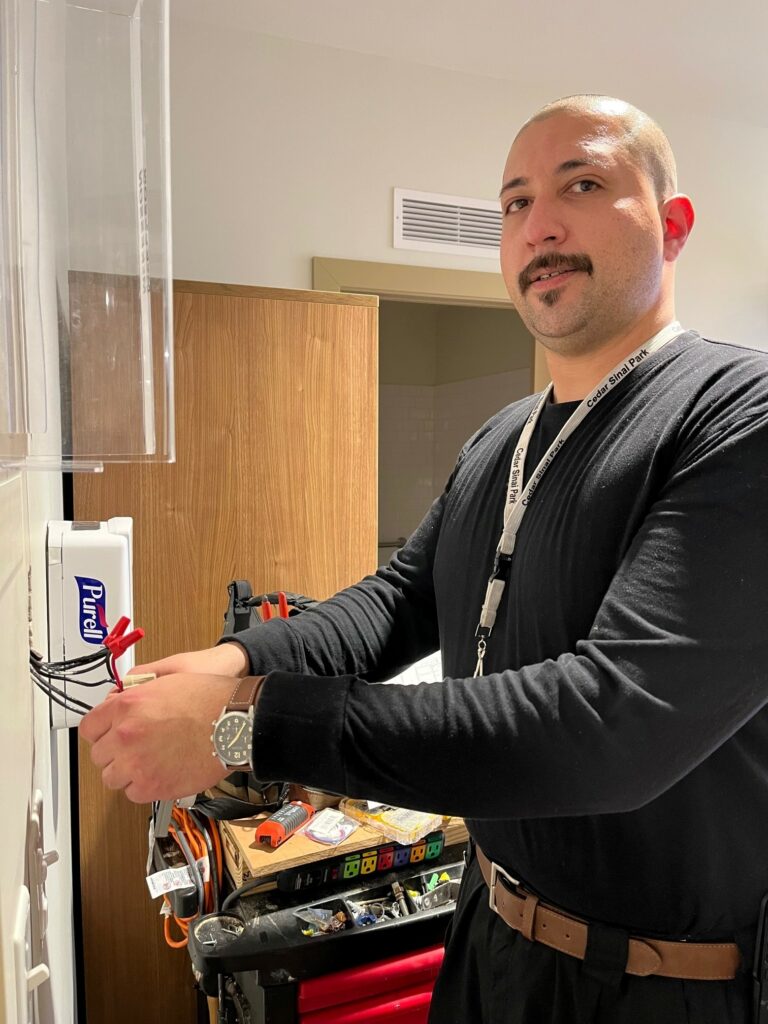
There isn’t much Aaron Farrar hasn’t taught himself about fixing stuff.
“I wasn’t really much of a handyman until I took an opportunity at another facility several years ago as the director of maintenance,” said Aaron, who became Cedar Sinai Park’s lead maintenance technician almost two years ago. “The former director quit and walked off the job, so there wasn’t anyone I could turn to for advice. I had no training whatsoever. They just threw me in and told me to figure it out.
There isn’t much Aaron Farrar hasn’t taught himself about fixing stuff.
“I wasn’t really much of a handyman until I took an opportunity at another facility several years ago as the director of maintenance,” said Aaron, who became Cedar Sinai Park’s lead maintenance technician almost two years ago. “The former director quit and walked off the job, so there wasn’t anyone I could turn to for advice. I had no training whatsoever. They just threw me in and told me to figure it out.
“It was just me and YouTube back then, and now over the years, I’ve done all kinds of different repairs. I truly have learned so much these last several years. I’ve found that sometimes, the best way to learn something is just to get in there and do it.”
Aaron grew up in southern California and moved to the Northwest 17 years ago for a change of scenery. First landing in Seattle where he worked in commercial and industrial heating and air conditioning, then on to Portland where he obtained jobs at memory care and assisted living facilities.
He joined Cedar Sinai Park in April of 2020, during the height of the pandemic. “The Jewish community seems to really look out for their own people, but happily welcomes people of many other backgrounds and ethnicities as well, and that was kind of cool to me.” said Aaron.
Aaron drives to Cedar Sinai Park from Vancouver every day, what can be a long drive given traffic, depending upon his hours.
“It’s not a thing of convenience,” said Aaron, with a laugh. “I enjoy coming to work. I enjoy what I do, helping residents and staff.”
“I’ve been treated well since I’ve been here. Vacation hours accrue quickly, and we even get free employee meals, which is always a plus. It seems real family oriented here. There are a lot of people who have worked here for over 20 years, which in my opinion speaks volumes. Things have gone well.”
The day we spoke with Aaron, he was troubleshooting an electrical issue on a couple of baseboard heaters in the 600 Hall of Robison, but most days, he is all over campus. Some days, his tasks are as simple as moving a bed or repairing a shelf. But he’s also dealt with extinguishing a dryer fire, repairing broken water lines, and is the backup for Building Services Director Tammy Heard.
“Tammy offers the team a lot of support, and so we do our best to support her, as well.”
When asked about the work he does on a typical day, Aaron explained: “You try to stick to a plan, which some days works fine, but then on other days, you’re not even close,” he said, laughing. “Sometimes, a repair that you thought would be a simple job ends up taking much longer. I help out here and there with the normal day-to-day tasks, but I also deal with the slightly more technical and complex issues that arise, which often require not only technical know-how, but also time spent researching effective solutions, and a lot of patience.
“For example,” said Aaron, “since starting at Robison nearly three years ago, I’ve taught myself, and others on the team, how to troubleshoot and repair hospital beds, mobile and ceiling-based patient lifts, and even the control operators that open and close many of the automatic doors in the facility. Prior to my arrival, most of that work was handled strictly by outside vendors.”
Last year, Aaron played a key role in obtaining approvals for both Robison and Rose Schnitzer Manor to receive $200,000 in state funds from the Oregon Department of Human Services, as part of their Long-Term Care Capital Improvement & Emergency Preparedness Program. As a result, both buildings received much-needed major repairs on their HVAC systems, and Robison was equipped with more than a dozen medical grade, high-efficiency HEPA air purifiers.
Two weeks ago, during Portland’s big snowstorm, Aaron drove the Cedar Sinai Park van to collect dozens of employees from their homes and got them to work safely, and then home again after their shift.
“Cedar Sinai Park has equipped its two vans with really nice, studded tires, so we were practically the only ones on the road who were still moving,” said Aaron. “There were busses in the middle of the road, completely abandoned, while other vehicles were sliding uncontrollably into each other like bumper cars. It was intense and quite stressful, for me at least.
“Jack Hellyer, the other maintenance technician who drove for the winter weather shuttle, on the other hand, didn’t seem to be bothered one bit by all the driving he did in such icy conditions,” said Aaron. “He apparently enjoyed it. But overall, the driving went well. We just made sure to drive really, really slow, making sure to get everyone to and from work safely.”
Aaron loves to read in his off time, mostly nonfiction such as politics, global affairs, and history. He’s computer savvy—he can build a website from scratch and knows how to code— and is currently learning how to use one of the many distributions of the Linux operating system. Last summer, he piloted his first plane, a small Cessna. He is a mentor to other employees on the maintenance team.
“I do my best to mitigate issues, put out what fires I can, and do whatever it is Tammy needs done at the moment.
“I really like it here.”
###

https://cedarsinaipark.org/wp-content/uploads/2024/06/3.9.23_Bulletin.pdf

by Kimberly Fuson, Chief Executive Officer
March 1, 2023
Three years ago, our trustees offered me the privilege to return to Cedar Sinai Park to help steer the organization on to a path of sustainability. With all my heart, I want Cedar Sinai Park to find and take steps to a solid future that will adapt maturely to the changing times and carry us into our next century.
At the core of our mission,
by Kimberly Fuson, Chief Executive Officer
March 1, 2023
Three years ago, our trustees offered me the privilege to return to Cedar Sinai Park to help steer the organization on to a path of sustainability. With all my heart, I want Cedar Sinai Park to find and take steps to a solid future that will adapt maturely to the changing times and carry us into our next century.
At the core of our mission, always, is caring for our beloved elders, with no compromise. That was the intent of our forebears when they met for the first time on January 4, 1920, to plan for the Jewish Old People’s Home—the first iteration of assisted living—and the Jewish community can be proud of the gemstone that was created and is dearly cherished.
Across the nation, single-site, faith-based, not-for-profit elder care communities are being challenged. Many are failing; hundreds closed last year in the United States. Others are merging or affiliating with bigger corporations.
Decades before the Covid pandemic, the 103-year-old Robison Jewish Home (dba Cedar Sinai Park) has contended with decreasing Medicaid reimbursements. Medicaid does not cover overhead, and only reimburses a certain percentage of each resident’s stay, per day. The reimbursement rate has ranged from 60 to 80 percent over the past decades. Given that the majority of our residents at Robison Jewish Health Center and Harold Schnitzer Center for Living utilize Medicaid, there is a significant gap in what we are paid, and what we have to spend to meet our high standards of care.
Our supportive community has subsidized resident care and services to offset some of the losses. Cedar Sinai Park received significant PPP (Paycheck Protection Program) funds during Covid, which directly subsidized staff wages.
We’ve also known since 2007 that the number of individuals approaching retirement age was rapidly increasing while the available population of caregivers was steadily decreasing. There are not enough nurses in the pipeline because Oregon has the third fewest graduates in nursing programs, and we rank last in the country for degrees awarded from public institutions. Nationwide, we are in a care crisis of monumental proportions.
Despite the ever-changing regulations of short- and long-term nursing care, historically, Robison stayed ahead of the labor curve, thanks to its excellent wages and benefits and terrific culture of community.
However, roughly 15 percent of the national nursing home workforce left the sector when the pandemic began. Finding qualified staff for Robison Jewish Health Center who want to work has been a major hurdle, despite a wage study we conducted during the summer of 2022, which resulted in substantial wage increases for our health professionals. With lower than desired numbers of staff, we haven’t been able to utilize all of the 44 beds in Robison Jewish Health Center short-term skilled nursing since the pandemic hit.
To maintain the quality care for which Robison is known, we have been relying for the past few years on “agency” health professionals, that is people contracted temporarily as nurses, licensed nurse practitioners, and certified nursing assistants. Agencies demand salaries for their professionals two to three times higher than what our employees receive, depending upon the shift they are asked to work.
Our significant staffing shortage coupled with the crushing cost of agency labor means Cedar Sinai Park is facing critical shortfalls monthly. If we continue on our current path, we determined our expenses would soon exceed our cash reserves and given the current climate, we believe we must act now.
With strong support from our trustees, on March 6, we reduced admissions to our post-acute and rehabilitation services at Robison Jewish Health Center.
The 48 private suites in the four households of the Harold Schnitzer Center for Living remain open, and skilled nursing referrals continue to be accepted on a more limited basis. We are consolidating all of the Robison Jewish Health Center clinical staff into the Harold Schnitzer Center for Living, and have eliminated all agency health professionals.
All of our Robison Jewish Health Center nursing department positions are preserved. All staff wages have been preserved.
We are consolidating culinary services, and all food production will occur at the Rose Schnitzer Manor kitchen, which will return us to an all-kosher campus.
Seven important humans, who will always be part of our Cedar Sinai Park family, are affected (reduction of hours/lay-off) by the change to Robison post-acute care services. We love all our staff and have made every effort to ensure they are cared for and supported during this transition. All staff affected by the suspension of admissions will be offered coaching/counseling, job referrals and letters of recommendation.
Robison Jewish Health Center/Harold Schnitzer Center for Living, Rose Schnitzer Active Assisted Living, Adult Day Services, and Sinai In-Home Care are fully functioning and open to the community. We continue to find ways to enhance our care and services, and to improve the quality of life for our residents.
Above all else, Cedar Sinai Park must remain viable for the elders and vulnerable who rely upon us. We have a long tradition of high-quality care and staffing, and we want to maintain that reputation in the community. The decision to reduce Robison admissions was not made lightly; we believe it is the best way to achieve our long-term goals.
Cedar Sinai Park is working with two expert advisory firms to help develop scenarios for sustainability. HJ Sims is an investment banking and strategic consulting firm specializing in senior housing financing. Clifton Larson Allen is an accounting firm whose focus is market analytics for senior care and other industries. We are also consulting with our industry peers and trade associations.
Once those analyses are conducted, Cedar Sinai Park will be in a better position to make decisions about its path to sustainability. We are a strong and sound organization. Cedar Sinai Park must change in order to be responsible and serve the needs of the Jewish community.
Thank you for your generous support of the Home for all of these years. We appreciate your gifts, your guidance, and your grace as we go through this important transition.

https://cedarsinaipark.org/wp-content/uploads/2024/06/3.2.23_Bulletin.pdf









